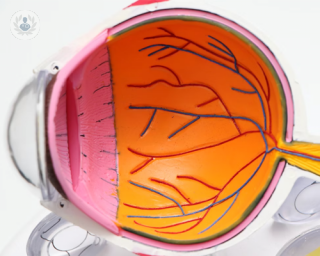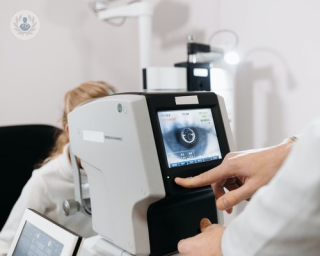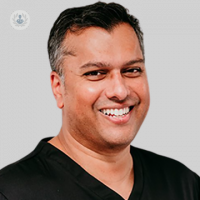What are ICL lens implants?
ICL lens implants are a form of corrective surgery for the eyes.
ICL stands for “Intraocular collamer lens”. It is an artificial lens that sits behind the pupil and in front of your natural lens, acting as a permanent contact lens. ICLs are also known as phakic intraocular lenses (PIOLs).
ICL lens implant surgery involves operating on the eye to put this lens into place.

Why are ICL lens implants sometimes needed?
ICL lens implants are offered if you have a high glasses prescription or astigmatism and you are under the age of 40. The aim of surgery is to give you 20/20 vision or better and reduce your dependence on glasses or contact lenses.
If you have ICL lens implant surgery in your 20s or 30s, you may still require further surgery such as laser eye surgery or refractive surgery later in life, as your prescription naturally changes as you get older.
You may not be suitable for ICL lens implant surgery if you have problems with your eyes such as cataracts or glaucoma.
What does the procedure involve?
The procedure involves lying down in a surgical tent while the surgeon looks through a microscopy to perform the surgery. You’ll be given some anaesthetic in the eye, both to block any pain and also to help your eye stay still during the procedure.
The procedure involves three steps:
- creating entry points into the eye for the lens implant
- inserting the lens and letting it unfold into place
- washing out the eye and closing up the entry points where necessary
In most cases you’ll need to come into the clinic for two separate procedures, one for each eye. This allows the ophthalmologist to check if the ICL fits the first eye correctly. Some clinics, however, offer to perform the procedure on both eyes in one sitting.
Overall, the procedure takes about 20 minutes per eye.
Aftercare
After the procedure you can return home straight away. You’ll be given advice on any side effects or complications to watch out for, as well advice on how to look after your eye. In particular, it’s important to:
- wearing an eye shield at night (usually for up to a week after surgery)
- avoiding swimming for a week and contact sports for a month
- waiting a few days before driving again
- using antibiotic and anti-inflammatory drops on a regular basis to help the eye heal well
If you experience pain, redness, or blurriness of vision, you should visit your eye surgeon immediately. You are likely to have a number of follow-up appointments scheduled to review your eye health and progress.
What are the alternatives?
ICL lens implant surgery is one of a number of options when it comes to corrective surgery. The right procedure depends on your prescription level and age. Other types of corrective eye surgery include:
- Laser eye surgery – commonly offered to patients with lower glasses prescription or without astigmatism
- Refractive lens exchange – generally offered to patients with higher prescriptions over the age of 40.
Finally, another alternative is to opt out of surgery altogether and wear contact lenses or glasses. This is a safer option but may restrict your ability to play certain sports, and may be more expensive in the long run.
09-04-2014Impianti di lenti ICL
What are ICL lens implants?
ICL lens implants are a form of corrective surgery for the eyes.
ICL stands for “Intraocular collamer lens”. It is an artificial lens that sits behind the pupil and in front of your natural lens, acting as a permanent contact lens. ICLs are also known as phakic intraocular lenses (PIOLs).
ICL lens implant surgery involves operating on the eye to put this lens into place.

Why are ICL lens implants sometimes needed?
ICL lens implants are offered if you have a high glasses prescription or astigmatism and you are under the age of 40. The aim of surgery is to give you 20/20 vision or better and reduce your dependence on glasses or contact lenses.
If you have ICL lens implant surgery in your 20s or 30s, you may still require further surgery such as laser eye surgery or refractive surgery later in life, as your prescription naturally changes as you get older.
You may not be suitable for ICL lens implant surgery if you have problems with your eyes such as cataracts or glaucoma.
What does the procedure involve?
The procedure involves lying down in a surgical tent while the surgeon looks through a microscopy to perform the surgery. You’ll be given some anaesthetic in the eye, both to block any pain and also to help your eye stay still during the procedure.
The procedure involves three steps:
- creating entry points into the eye for the lens implant
- inserting the lens and letting it unfold into place
- washing out the eye and closing up the entry points where necessary
In most cases you’ll need to come into the clinic for two separate procedures, one for each eye. This allows the ophthalmologist to check if the ICL fits the first eye correctly. Some clinics, however, offer to perform the procedure on both eyes in one sitting.
Overall, the procedure takes about 20 minutes per eye.
Aftercare
After the procedure you can return home straight away. You’ll be given advice on any side effects or complications to watch out for, as well advice on how to look after your eye. In particular, it’s important to:
- wearing an eye shield at night (usually for up to a week after surgery)
- avoiding swimming for a week and contact sports for a month
- waiting a few days before driving again
- using antibiotic and anti-inflammatory drops on a regular basis to help the eye heal well
If you experience pain, redness, or blurriness of vision, you should visit your eye surgeon immediately. You are likely to have a number of follow-up appointments scheduled to review your eye health and progress.
What are the alternatives?
ICL lens implant surgery is one of a number of options when it comes to corrective surgery. The right procedure depends on your prescription level and age. Other types of corrective eye surgery include:
- Laser eye surgery – commonly offered to patients with lower glasses prescription or without astigmatism
- Refractive lens exchange – generally offered to patients with higher prescriptions over the age of 40.
Finally, another alternative is to opt out of surgery altogether and wear contact lenses or glasses. This is a safer option but may restrict your ability to play certain sports, and may be more expensive in the long run.


ICL: the advantages of implantable contact lenses
Mr CT Pillai
2024-11-20
Vision. Perhaps the sense we rely on most to perceive the world is our sight. A variety of problems can affect our eyesight, and to combat these, technology and procedures to treat our eyes are continually advancing. Laser eye surgery is well-known and comes in a number of forms, but another option is that of implantable contact lenses (ICLs). Esteemed ophthalmologist Dr CT Pillai explains: Mostrare di più


A thorough guide to ICL implants
Mr Alexander Ionides
2024-11-18
'The permanent contact lenses', implantable Collamer lenses, are a long-term solution to improve eyesight. Highly esteemed London-based consultant ophthalmologist Mr Alexander Ionides discusses implantable Collamer lenses; what the procedure is and what to expect post-operation. Mostrare di più


ICL implants
Mr Radwan Almousa
2024-11-11
ICL implants have emerged as one of the best alternatives to glasses and laser surgery. Consultant ophthalmologist Mr Radwan Almousa is here to tell us more about this procedure. Mostrare di più
Medici esperti in Impianti di lenti ICL
-
Mr Scott Robbie
OftalmologiaEsperto in:
- Cateratta
- Impianti di lenti ICL
- Chirurgia dell'occhio laser
- Capsulotomia laser YAG
- Lenti intraoculari
- Chirurgia refrattiva con laser
-
Mr Rakesh Jayaswal
OftalmologiaEsperto in:
- Cornea
- Cateratta
- Chirurgia dell'occhio laser
- Lenti intraoculari
- Impianti di lenti ICL
- Malattie della cornea
-
Mr Sumith Perera
OftalmologiaEsperto in:
- Cateratta
- Chirurgia refrattiva con lente intraoculare
- Impianti di lenti ICL
- Chirurgia dell'occhio laser
- LASIK
- Chirurgia refrattiva con laser
-
Mr Nick Kopsachilis
OftalmologiaEsperto in:
- Chirurgia della cataratta
- Occhio secco
- Chirurgia dell'occhio laser
- Chirurgia refrattiva con lente intraoculare
- Impianti di lenti ICL
- Cheratocono
-
Mr Kieren Darcy
OftalmologiaEsperto in:
- Lenti intraoculari
- Impianti di lenti ICL
- Cheratocono
- Chirurgia dell'occhio laser
- Chirurgia della cataratta
- Visualizzare tutti

Westminster Bridge Consulting Rooms at St Thomas' Hospital Private Healthcare.
Westminster Bridge Consulting Rooms at St Thomas' Hospital Private Healthcare.
Westminster Bridge Road, London
No existe teléfono en el centro.
Se utilizzi questo numero di Top Doctors autorizzi al trattamento dei dati a fini statistici e commerciali. Per maggiori informazioni, leggi la nostra l’informativa sulla privacy
Top Doctors

Vision and Surgery
Vision and Surgery
The Fakenham Medical Practice, Meditrina House, Trinity Road, Fakenham
No existe teléfono en el centro.
Se utilizzi questo numero di Top Doctors autorizzi al trattamento dei dati a fini statistici e commerciali. Per maggiori informazioni, leggi la nostra l’informativa sulla privacy
Top Doctors

Mount Alvernia Hospital - part of Circle Health Group
Mount Alvernia Hospital - part of Circle Health Group
Harvey Road, Guildford GU1 3LX
No existe teléfono en el centro.
Se utilizzi questo numero di Top Doctors autorizzi al trattamento dei dati a fini statistici e commerciali. Per maggiori informazioni, leggi la nostra l’informativa sulla privacy
Top Doctors
-
Westminster Bridge Consulting Rooms at St Thomas' Hospital Private Healthcare.
Westminster Bridge Road, London , SE1 South Bank LondonEsperto in:
- Chirurgia generale
- Chirurgia ortopedica
- Chirurgia plastica, estetica e riparatrice
- Endocrinologia
- Ginecologia e Ostetricia
- Pediatria
-
Vision and Surgery
The Fakenham Medical Practice, Meditrina House, Trinity Road, Fakenham, FakenhamEsperto in:
- Cataratta
- Chirurgia delle palpebre
- Chirurgia oftalmologica laser
- Condizioni oculari complesse
- Impianti per lenti ICL
- Oftalmologia
-
Mount Alvernia Hospital - part of Circle Health Group
Harvey Road, Guildford GU1 3LX, GuildfordEsperto in:
- Anca
- Tumori
- Cardiologia
- Chirurgia generale
- Chirurgia ortopedica
- Chirurgia spinale ortopedica
- Visualizzare tutti







